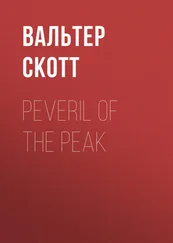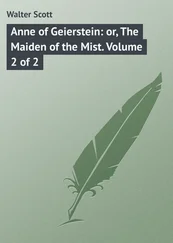Walter Scott - Peveril of the Peak
Здесь есть возможность читать онлайн «Walter Scott - Peveril of the Peak» весь текст электронной книги совершенно бесплатно (целиком полную версию без сокращений). В некоторых случаях можно слушать аудио, скачать через торрент в формате fb2 и присутствует краткое содержание. Жанр: Исторические приключения, на английском языке. Описание произведения, (предисловие) а так же отзывы посетителей доступны на портале библиотеки ЛибКат.
- Название:Peveril of the Peak
- Автор:
- Жанр:
- Год:неизвестен
- ISBN:нет данных
- Рейтинг книги:4 / 5. Голосов: 1
-
Избранное:Добавить в избранное
- Отзывы:
-
Ваша оценка:
- 80
- 1
- 2
- 3
- 4
- 5
Peveril of the Peak: краткое содержание, описание и аннотация
Предлагаем к чтению аннотацию, описание, краткое содержание или предисловие (зависит от того, что написал сам автор книги «Peveril of the Peak»). Если вы не нашли необходимую информацию о книге — напишите в комментариях, мы постараемся отыскать её.
Peveril of the Peak — читать онлайн бесплатно полную книгу (весь текст) целиком
Ниже представлен текст книги, разбитый по страницам. Система сохранения места последней прочитанной страницы, позволяет с удобством читать онлайн бесплатно книгу «Peveril of the Peak», без необходимости каждый раз заново искать на чём Вы остановились. Поставьте закладку, и сможете в любой момент перейти на страницу, на которой закончили чтение.
Интервал:
Закладка:
Men's minds were now beginning to cool—the character of the witnesses was more closely sifted—their testimonies did not in all cases tally—and a wholesome suspicion began to be entertained of men, who would never say they had made a full discovery of all they knew, but avowedly reserved some points of evidence to bear on future trials.
The King also, who had lain passive during the first burst of popular fury, was now beginning to bestir himself, which produced a marked effect on the conduct of the Crown Counsel, and even the Judges. Sir George Wakeman had been acquitted in spite of Oates's direct testimony; and public attention was strongly excited concerning the event of the next trial; which chanced to be that of the Peverils, father and son, with whom, I know not from what concatenation, little Hudson the dwarf was placed at the bar of the Court of King's Bench.
It was a piteous sight to behold a father and son, who had been so long separated, meet under circumstances so melancholy; and many tears were shed, when the majestic old man—for such he was, though now broken with years—folded his son to his bosom, with a mixture of joy, affection, and a bitter anticipation of the event of the impending trial. There was a feeling in the Court that for a moment overcame every prejudice and party feeling. Many spectators shed tears; and there was even a low moaning, as of those who weep aloud.
Such as felt themselves sufficiently at ease to remark the conduct of poor little Geoffrey Hudson, who was scarcely observed amid the preponderating interest created by his companions in misfortune, could not but notice a strong degree of mortification on the part of that diminutive gentleman. He had soothed his great mind by the thoughts of playing the character which he was called on to sustain, in a manner which should be long remembered in that place; and on his entrance, had saluted the numerous spectators, as well as the Court, with a cavalier air, which he meant should express grace, high-breeding, perfect coolness, with a noble disregard to the issue of their proceedings. But his little person was so obscured and jostled aside, on the meeting of the father and son, who had been brought in different boats from the Tower, and placed at the bar at the same moment, that his distress and his dignity were alike thrown into the background, and attracted neither sympathy nor admiration.
The dwarf's wisest way to attract attention would have been to remain quiet, when so remarkable an exterior would certainly have received in its turn the share of public notice which he so eagerly coveted. But when did personal vanity listen to the suggestions of prudence?—Our impatient friend scrambled, with some difficulty, on the top of the bench intended for his seat; and there, "paining himself to stand a-tiptoe," like Chaucer's gallant Sir Chaunticlere, he challenged the notice of the audience as he stood bowing and claiming acquaintance of his namesake Sir Geoffrey the larger, with whose shoulders, notwithstanding his elevated situation, he was scarcely yet upon a level.
The taller Knight, whose mind was occupied in a very different manner, took no notice of these advances upon the dwarf's part, but sat down with the determination rather to die on the spot than evince any symptoms of weakness before Roundheads and Presbyterians; under which obnoxious epithets, being too old-fashioned to find out party designations of newer date, he comprehended all persons concerned in his present trouble.
By Sir Geoffrey the larger's change of position, his face was thus brought on a level with that of Sir Geoffrey the less, who had an opportunity of pulling him by the cloak. He of Martindale Castle, rather mechanically than consciously, turned his head towards the large wrinkled visage, which, struggling between an assumed air of easy importance, and an anxious desire to be noticed, was grimacing within a yard of him. But neither the singular physiognomy, the nods and smiles of greeting and recognition into which it was wreathed, nor the strange little form by which it was supported, had at that moment the power of exciting any recollections in the old Knight's mind; and having stared for a moment at the poor little man, his bulky namesake turned away his head without farther notice.
Julian Peveril, the dwarf's more recent acquaintance, had, even amid his own anxious feelings, room for sympathy with those of his little fellow-sufferer. As soon as he discovered that he was at the same terrible bar with himself, although he could not conceive how their causes came to be conjoined, he acknowledged him by a hearty shake of the hand, which the old man returned with affected dignity and real gratitude. "Worthy youth," he said, "thy presence is restorative, like the nepenthe of Homer even in this syncopé of our mutual fate. I am concerned to see that your father hath not the same alacrity of soul as that of ours, which are lodged within smaller compass; and that he hath forgotten an ancient comrade and fellow-soldier, who now stands beside him to perform, perhaps, their last campaign."
Julian briefly replied, that his father had much to occupy him. But the little man—who, to do him justice, cared no more (in his own phrase) for imminent danger or death, than he did for the puncture of a flea's proboscis—did not so easily renounce the secret object of his ambition, which was to acquire the notice of the large and lofty Sir Geoffrey Peveril, who, being at least three inches taller than his son, was in so far possessed of that superior excellence, which the poor dwarf, in his secret soul, valued before all other distinctions, although in his conversation, he was constantly depreciating it. "Good comrade and namesake," he proceeded, stretching out his hand, so as to again to reach the elder Peveril's cloak, "I forgive your want of reminiscence, seeing it is long since I saw you at Naseby, fighting as if you had as many arms as the fabled Briareus."
The Knight of Martindale, who had again turned his head towards the little man, and had listened, as if endeavouring to make something out of his discourse, here interrupted him with a peevish, "Pshaw!"
"Pshaw!" repeated Sir Geoffrey the less; " Pshaw is an expression of slight esteem,—nay, of contempt,—in all languages; and were this a befitting place——"
But the Judges had now taken their places, the criers called silence, and the stern voice of the Lord Chief Justice (the notorious Scroggs) demanded what the officers meant by permitting the accused to communicate together in open court.
It may here be observed, that this celebrated personage was, upon the present occasion, at a great loss how to proceed. A calm, dignified, judicial demeanour, was at no time the characteristic of his official conduct. He always ranted and roared either on the one side or the other; and of late, he had been much unsettled which side to take, being totally incapable of anything resembling impartiality. At the first trials for the Plot, when the whole stream of popularity ran against the accused, no one had been so loud as Scroggs; to attempt to the character of Oates or Bedloe, or any other leading witnesses, he treated as a crime more heinous than it would have been to blaspheme the Gospel on which they had been sworn—it was a stifling of the Plot, or discrediting of the King's witnesses—a crime not greatly, if at all, short of high treason against the King himself.
But, of late, a new light had begun to glimmer upon the understanding of this interpreter of the laws. Sagacious in the signs of the times, he began to see that the tide was turning; and that Court favour at least, and probably popular opinion also, were likely, in a short time, to declare against the witnesses, and in favour of the accused.
The opinion which Scroggs had hitherto entertained of the high respect in which Shaftesbury, the patron of the Plot, was held by Charles, had been definitely shaken by a whisper from his brother North to the following effect: "His Lordship has no more interest at Court than your footman."
Читать дальшеИнтервал:
Закладка:
Похожие книги на «Peveril of the Peak»
Представляем Вашему вниманию похожие книги на «Peveril of the Peak» списком для выбора. Мы отобрали схожую по названию и смыслу литературу в надежде предоставить читателям больше вариантов отыскать новые, интересные, ещё непрочитанные произведения.
Обсуждение, отзывы о книге «Peveril of the Peak» и просто собственные мнения читателей. Оставьте ваши комментарии, напишите, что Вы думаете о произведении, его смысле или главных героях. Укажите что конкретно понравилось, а что нет, и почему Вы так считаете.








